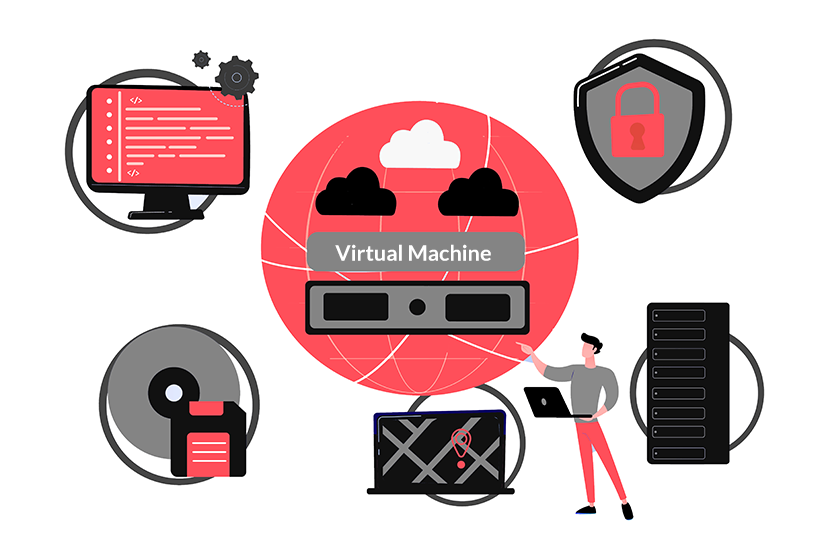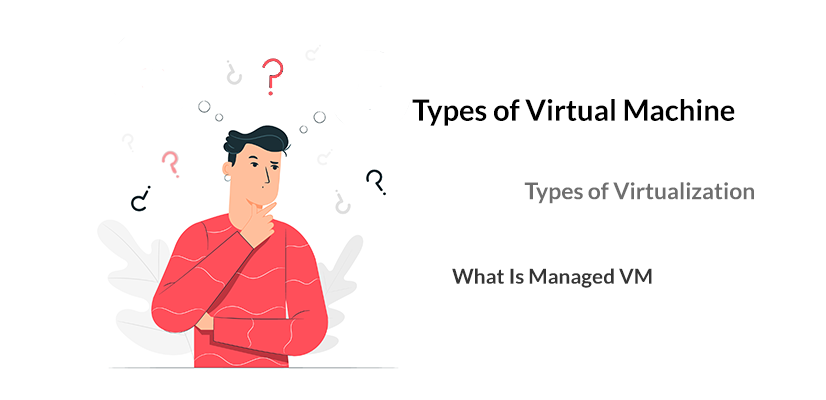
What is VM? VM stands for Virtual Machine, enabling you to run different operating systems on it, such as Windows or Linux. A VM behaves completely like your computer, and it can be used to run software that you can’t run on your computer, online apps, launch a website, etc.
There are many reasons why you should upgrade to VM from shared, different types of a virtual machine. In this article, we would like to talk about Virtual Machine and explain everything you must know.
What is Virtual Machine? Is It Reliable?
A virtual machine allows you to create an environment virtually. A Virtual Machine runs as a window on any operating system you are currently running on your computer. A Virtual Machine works like a separate computer with its operating system. A Virtual Machine works as if it’s a real computer, and it can install and run the software as you normally would.
There are terms in the Virtual Machine world. For example, the VM is running on your computer, and your computer is called the host; the operating system installed on the VM is called guests. The operating system installed on a VM is stored on a virtual hard drive that takes a portion of your real hard drive.
Typically, VM tends to overheat your computer. Thus, it may not be as fast as your computer. Now that you are familiar with what a virtual machine is, we will get into different virtual machine types. You can install a virtual machine on your PC with Oracle VM, which is the most trusted software for setting up a virtual environment.
When Should You Upgrade to Virtual Machine?
The main reason someone should use or upgrade to a Virtual Machine is server consolidation. As most operating systems and applications tend to use a small portion of resources, by going virtual, you can save tons of resources and have more virtual servers into one single server, which is a great option for hardware utilization.
This, of course, eliminates the need to purchase any extra resources like hardware, RAM, etc. Also, it reduces your power cost. Typically, a Virtual Machine (VM) provides better disaster recovery options simply by enabling the failover feature as to previously having to add extra hardware to enable this option.
A Virtual Machine runs on its own environment and won’t interfere with the rest of the system, and it is somewhat isolated from the host’s hardware. This isolation makes it a perfect solution to test new applications without worrying about any security leaks and whatnot.
Nowadays, many hosting providers have gone virtual and are offering virtual services such as cloud hosting, VPS, etc.
What is WordPress VPS Hosting
VPS stands for Virtual Private Server; it functions similarly to a dedicated server but on a smaller scale. Instead of having a single physical server, you pull resources from multiple servers connected virtually. There is a small difference between your daily shared hosting plan to a VPS hosting and, more specifically, WordPress. In WordPress shared hosting, the server is configured specifically for WordPress, but it may have a dozen other users on the same server because it is shared. Whereas WordPress VPS hosting is also configured for WordPress, but it pulls resources from different servers. Thus, your website, application, etc., won’t go down, and it is always up.
As mentioned, a WordPress VPS hosting is a normal Virtual Private Server configured for WordPress, and it can run WordPress smoothly and without any issues.
Types of Virtual Machine and Their Uses

There are two types of virtual machines. However, we have different types of Virtualization that we will talk about down below. But first, let’s talk about different types of VM. The two types of Virtual Machines are called A Process Virtual Machine and A System Virtual Machine.
A Process Virtual Machine enables a single process to run on it as an application. It provides an environment that is isolated, and it is perfect for programmers. An example of a Process Virtual Machine is the popular Java Virtual Machine which allows the operating system of the VM to run Java applications without any errors.
On the other hand, a System Virtual Machine is a virtualized version of physical machines. It enables the hosts’ physical resources to be shared among multiple VMs, and each of them can have their operating system. An example of this type is a VPS.
What Are the Different Types of Virtualization?
As mentioned, there are two types of virtual machines and a few types of Virtualization.
– Hardware Virtualization
Hardware Virtualization is when you virtualize hardware. For example, It is where you virtualize a server’s hardware and share the resources amongst a few different clients.
– Software Virtualization
Software Virtualization creates an environment where multiple users can access one software. For example, some Android devices can run on a host machine using the Windows operating system and utilizing the same hardware as the host. A better example would be universities. They often use a single software for an entire classroom. They achieve that by simply virtualizing the software.
– Storage Virtualization
Much like hardware and software, storage can also be virtualized. You can consolidate multiple storage devices to show up as a single storage device. This, of course, increases the performance and speed of the storage device and reduces the cost. More importantly, it is perfect and recommended for disaster recovery.
– Network Virtualization
Networks can also be created on a physical network and turned into one big network containing a lot of virtual networks. Network virtualization is the perfect choice for companies with a huge number of users who need to have access to a certain network at any given time.
– Desktop Virtualization
Desktop Virtualization is the most common amongst all. It separates the physical device from the desktop environment and allows you to have a remote server. Also, it enables users to access their computers wherever they are.
What Is Managed Virtual Machine
A managed virtual machine or MVM, for short, is a VM that is suitable for developers and allows them to start working on system platforms as it would reduce the manual process of installing and configuring an environment. Also, it enables the development to be synced with the host at all times.
What is Dedicated Virtual Server and Virtual Machine Host
A dedicated virtual server is a virtual server that may look like a dedicated server, but it is a virtual server installed on the computer of a user. There can be multiple dedicated virtual servers installed on a computer, and each of them can have its operating system.
A Virtual Machine host is exactly like a virtual machine. Still, they are separated from the physical aspect, and they enable users to pull resources and access machines.
Frequently Asked Questions
What are the differences between managed and unmanaged VM?
Managed Virtual Machine is where a team of experts or software is monitoring the virtual server, and should there are any issues, it will notify the user and warn them about it. Unmanaged is exactly what it sounds like; the server and created virtual environment are totally up to the users, and they should manually configure and monitor it.
What is cPanel VPS hosting?
cPanel is a control panel interface designed specifically for website owners. It can simplify uploading, managing web pages, creating email accounts, installing web applications, generating visitors statistics, reviewing errors, etc.
Do you configure VM yourself?
Yes. Thanks to the VM software that you can download for free, you can configure the installation process yourself and allocate RAM, storage, and CPU usage as much as you like to the created Virtual Machine on your computer. As you are in charge of configuring the VM, you can fix them yourself if you face any errors.
What is your virtual machine uptime?
Since the VM is created on either your computer or highly specified servers, the uptime is close to 100%. Meaning, you may hardly see it going down.
How fast and reliable are your servers?
VM-created environments are highly secure and fast as they pull resources from multiple servers. Also, they are the newest technology and use NVMe SSD and use the most recent CPU in the market and DDR4 RAM.
Can you install cPanel and LiteSpeed?
Yes. Our experts’ team can install and configure cPanel for you.
Is virtual machine safe?
Yes. Virtual Machines are considered an isolated environment from the physical operating system. You can run all sorts of software without having to fear compromising your operating system.
Leave a Reply